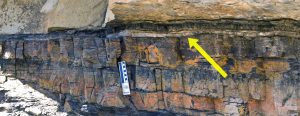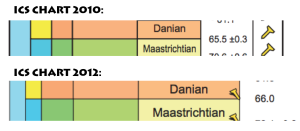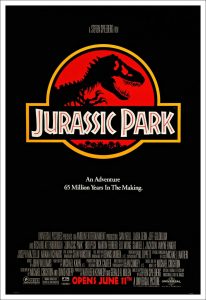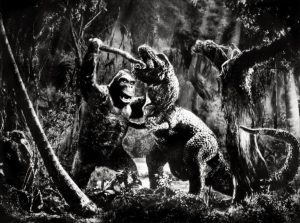[ad_1]
As this text is being first posted, the world lies on the precipice of the following massive palaeo-media drama debacle. One week from immediately, the film “65” might be launched in cinemas, an motion movie that, judging from all trailers and pre-release info, will be greatest summed up as ‘Adam Driver from the longer term shoots dinosaurs.’
What occurs subsequent is inevitable. The palaeo world will erupt into fiery discourse on-line, with numerous posts, movies, and articles discussing the designs and scientific accuracy of the dinosaurs depicted within the movie. Some will violently cry foul, others will say that’s only a film and to not make such a giant deal over it. However I’m not right here to speak in regards to the dinosaurs themselves in any respect, I’m within the title of the movie, which is bound to be one other massive speaking level.

The film is named “65”, with the concept being that resulting from some time-travel shenanigans, the characters discover themselves 65 million years prior to now. Any informal dino fan might be very acquainted with that date as being the time when the dinosaurs supposedly went extinct. The one downside with this, for the sake of them and the movie, is that it isn’t actually.
By the most effective estimation of present science, the dinosaurs went extinct nearer to 66 million years in the past (mya). Just one quantity totally different, it appears a comparatively small margin of error, till you realise that this leaves the brand new movie with a quite obtrusive plot gap of being a dinosaur function set over half 1,000,000 years after the extinction of the dinosaurs. Should you went to see a regency interval piece and the drama all happened within the Mammoth Steppes of the mid-Pleistocene, you’d have some questions.

So how is it that we all know the time the dinosaurs grew to become extinct, and why accomplish that many people have it simply that little bit flawed?
The examine of the earth’s timeline is called geochronology, with the dates typically generated by a course of generally known as radiometric courting. This course of includes taking a look at radioactive isotopes throughout the rock. These isotopes decay to their secure kinds at a predictable price (notably taking a look at their half-life – the period of time it takes for the quantity of the radioactive isotopes to half). A standard instance is the isotope Uranium-238, which decays into the secure Lead-206. By trying on the ratio of radioactive to secure isotopes, the date of the rock will be calculated.
As that pretty dry and nonetheless fairly technical description highlights, it’s a quite laborious space of science. Therefore why it by no means made it into the mainstream of standard science in the identical manner as different elements of geology, like volcanoes. ‘Mountain go bang’ is simply simpler to understand. However however, outcomes from these research have been used to present numerical date values to the teams we had beforehand outlined nearly purely from their fossil assemblages and rock variations, the eons, eras, durations, and levels.
These boundaries are normally marked by some substantial change within the local weather, durations of volcanism, or the presence and absence of sure indicative animal and plant species. So far as these boundaries go, there aren’t many extra marked than that which spells the tip of the Cretaceous.
We’re all acquainted with the story of the asteroid affect which spelt the tip of the dinosaur age. This affect left a mark within the rock of the earth past simply the massive crater on the Yucatan Peninsula. It additionally resulted in a layer of rock wealthy within the mineral iridium which will be discovered everywhere in the planet. Few durations have such an simply outlined mark of their finish than the strong line within the rock which calls the Cretaceous to a detailed. It’s this line which is defines the date of the dino extinction.

Each few years, with extra exact gear and a refined course of, the dates are re-tested and a brand new official geological timescale introduced. This typically leads to a number of dates altering by small decimals, fluxing over a number of thousand years or so, normally bothering none however essentially the most pedantic daters. However in August 2012 a timescale was printed by the Worldwide Fee on Stratigraphy with one very substantial replace; that acquainted time for the dinosaur extinction had shifted from the previous trustworthy 65, to 66 million years in the past.

Nothing had actually modified; the Cretaceous hadn’t magically turn into additional away in time. It was merely a matter of a extra correct recording being made, and us updating our labelling of the boundary accordingly.
Over ten years have now handed since this replace, however the information clearly hasn’t actually trickled by means of to the mainstream but. So why is that?
A big a part of the explanation might be that first impressions are key in palaeontology (and science media basically); it’s the preliminary discovery that makes the banner headline information, and the refinement to accuracy is reported quietly, buried deep within the area of interest media shops, if certainly it’s fortunate sufficient to get a press launch in any respect. When the science first gave a proposed date for the extinction of the dinosaurs they stated 65mya, and that’s the model of occasions that caught.
Solely having been up to date in 2012, because of this when the overwhelming majority of adults within the inhabitants have been rising by means of their dinosaur-phase as kids (everybody has one) it was that 65mya determine they stored listening to. Relying on the documentary, e book, or recreation they have been experiencing, the appears to be like of the dinosaurs might need modified, among the quoted science might have differed, however there was one indisputable fact that was all the time talked about, and was the identical each time; ‘The dinosaurs went extinct 65 million years in the past.’ It ensured that it was one reality that actually stayed with you.
It even made it properly past simply academic media and into the mainstream due to that previous good friend/bane of palaeontology, ‘Jurassic Park’. When the film first launched thirty years in the past, it memorably did so with the tagline ‘An journey 65 million years within the making’ printed on each poster and introduced on the finish of each trailer. Contemplating the affect and scale of this movie’s recognition, that quantity and dinosaurs grew to become ever extra intertwined.

In actual fact, that quantity really grew to become so synonymous with dinosaurs that it grew to become the go-to reply for time regardless of the context. Overlook the extinction, everytime you ask somebody “When did the dinosaurs dwell?”, 65 mya continues to be normally the preferred reply. It factors to a different pretty common false impression in regards to the dinosaurs, which is that individuals don’t typically realise simply how lengthy they as a bunch have been on this planet.
Certain the dinosaurs went extinct at 66 mya however they first appeared nearer to 230 mya, that means the dinosaurs have been round for about 170 million years. Contemplating that our genus, Homo, has solely been knocking about for round 2.5 million years, we’re actually in no place to undermine the achievements of our dinosaurian buddies. When requested the query of when the dinosaurs lived, you might give a really big vary of solutions. However no person ever appears to say the secure, correct, and pleasingly rounded determine of maybe 100 mya, they repeatedly say 65 mya. As if the primary dinosaurs born might have seen the asteroid coming in the event that they lived to be grandparents.
However maybe it’s too merciless to dismiss those that say 65 mya as a time you could find dwelling dinosaurs, because it does at the least have a logic behind it. Different pop-culture options have been much more faraway from the mark. The track “Everyone stroll the dinosaur” clocks them in at 40 million years in the past, “The Flintstones” has them solely 12 thousand years in the past, and the movie “One Million Years BC” positioned them… properly take a guess. And naturally that’s earlier than we get into the myriad of productions which have them nonetheless alive on some hidden volcanic island (a la “The Misplaced World” and “King Kong”) or by some means surviving within the core of the planet (“Land of the Misplaced”, “Iron Sky 2” and, bizarrely “King Kong” once more).

So “65” could also be removed from the primary palaeo pop-culture enterprise to be flawed in regards to the date of dinosaur life, however it’s maybe essentially the most irritating of all of them. As a result of frankly there isn’t actually any excuse for it. Hollywood movies have budgets of multi-millions of {dollars} and take years to make, and with all that time and cash they apparently didn’t even ask a single one that might have advised them that the very premise of the movie was incorrect. It could have taken one second, after which they wouldn’t have spent a fortune advertising and marketing a movie that by some means manages to include a fallacy inside its actually two-character-long title. It’s no marvel this movie will certainly trigger quite a lot of palaeo discourse.
Although maybe the most effective plan of action is to keep away from the discourse fully. And that’s the reason, when my fellow palaeontologists are all out hate watching ‘65’, me and my fellow refined purveyors of positive arts shall as a substitute be indulging in our seventh screening of ‘Cocaine Bear’, good day sir.
Rhys Charles is the Engagement Officer for the Earth Sciences division of the College of Bristol, and has headed the Bristol Dinosaur Mission since 2016. (@tweetodontosaur)
Article edited by
References
65 (2023) dir. Scott Beck & Bryan Woods. Sony Footage.
Worldwide Chronostratigraphic Chart (2012) Worldwide Fee on Stratigraphy
[ad_2]